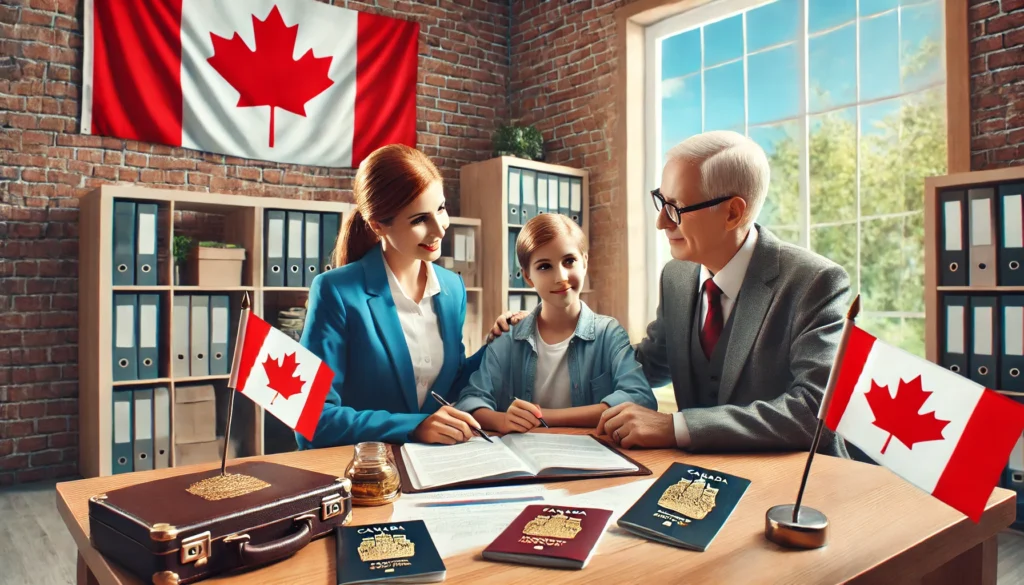Canada is a land of opportunity, and its doors are wide open to visitors from across the globe. But when it comes to inviting family members, particularly parents and grandparents, you might be wondering which visa is the right one: the visitor visa or the super visa. Both have their advantages, but which is the best fit for your situation? In this guide, we’ll break down the differences between the two and help you choose the option that best suits your needs.
What is a Visitor Visa?
The visitor visa, also known as a Temporary Resident Visa (TRV), is ideal for those who want to explore Canada, visit family, or attend business meetings. The application process is straightforward, but it’s essential to understand the specific requirements for a visitor visa in Canada to ensure a smooth experience.
The visitor visa is perfect for people who plan to visit Canada for a brief period, such as attending a family event, exploring the country, or meeting business partners. It’s flexible and easy to apply for, especially if you don’t require a long-term stay.
What is a Super Visa?
The super visa was designed specifically for parents and grandparents of Canadian citizens or permanent residents. The super visa for parents offers the opportunity for extended visits, allowing them to stay in Canada for up to two years without needing to reapply for their visa.
Families can spend quality time together, free from the stress of frequent renewals and paperwork. It eliminates the hassle of renewing a visa every six months, allowing for more relaxed, long-term stays.
Super Visa vs Visitor Visa: Key Differences

1. Length of Stay
- Visitor Visa: You can stay in Canada for up to six months at a time, making it suitable for short-term visits like vacations, family events, or business meetings.
- Super Visa: The super visa allows parents and grandparents to stay for up to two years per visit, providing an extended stay without the need for constant renewals or reapplications.
2. Medical Insurance
- Visitor Visa: There is no requirement for medical insurance with a visitor visa, which makes it a more accessible option for short-term stays where health coverage isn’t a necessity.
- Super Visa: Applicants must have Canadian medical insurance with at least $100,000 in coverage for one year, ensuring comprehensive protection during extended stays in Canada for parents and grandparents.
3. Eligibility
- Visitor Visa: The visitor visa is open to anyone who meets Canada’s basic entry requirements, making it a flexible choice for tourists, business visitors, or individuals visiting family or friends.
- Super Visa: The super visa is exclusively available to parents and grandparents of Canadian citizens or permanent residents, making it a family-specific visa designed for long-term visits.
4. Application Process
- Visitor Visa: The visitor visa requires basic documents, including a valid passport, proof of financial support, and ties to your home country, making the application process relatively straightforward for short-term visitors.
- Super Visa: The super visa requires more detailed documentation, including an invitation letter, proof of the host’s income, medical insurance, and a medical exam, making it a more comprehensive application.
5. Reapplication
- Visitor Visa: If you wish to stay longer than six months, you must apply for an extension or reapply for a new visa, which could involve additional paperwork and waiting time.
- Super Visa: With a super visa, parents and grandparents can enter multiple times over a period of up to 10 years without reapplying, making it ideal for long-term and repeated visits.
6. Financial Support
- Visitor Visa: Visitors need to show proof of sufficient funds to cover their stay in Canada, but there’s no formal income requirement from the host or family supporting their visit.
- Super Visa: The host, who must be a Canadian citizen or permanent resident, must meet specific income requirements to demonstrate they can financially support their parents or grandparents during their stay.
Who Should Choose a Visitor Visa?
- 1. Best Scenarios for Applying for a Visitor Visa: The visitor visa is perfect for individuals who plan to visit Canada for a short time. If your parents or grandparents are visiting for holidays, special occasions, or brief stays, the visitor visa in Canada is a simpler, quicker option.
- 2. Short-term Visits and Temporary Stay: If the visit is meant to be a short one, under six months, and there’s no need for an extended stay, the visitor visa is a hassle-free choice.
Who Should Choose a Super Visa?
- Ideal Candidates for a Super Visa: The super visa is an excellent option for parents and grandparents who wish to stay in Canada for an extended period. This visa is designed for families who need more time together without the inconvenience of frequent renewals.
- Extended Stay for Parents and Grandparents: If your parents or grandparents plan to visit you for more than six months, the super visa for parents is by far the better choice. It allows for long visits and multiple entries, reducing the stress of reapplying.
Super Visa Requirements

The super visa Canada requirements are slightly more complex than a standard visitor visa. The super visa invitation letter is a crucial part of the application, as it demonstrates that the visitor will be financially supported throughout their stay.
- A letter of invitation from a child or grandchild who is a permanent resident or citizen of Canada. This letter should include a promise of financial support during the visit.
- Proof of income from the host, showing that they meet the minimum income threshold.
- Medical insurance coverage for at least one year with a minimum coverage of $100,000 from a Canadian insurance company.
- Medical examination to ensure the parent or grandparent is healthy enough to visit Canada.
Visitor Visa Requirements
The visitor visa to Canada is a flexible option for those who plan shorter stays and do not require the extensive documentation that comes with the super visa. You’ll need:
- A valid passport.
- Strong evidence of connections to your home country, such as employment, owned property, or close family relationships
- Evidence of your ability to maintain yourself financially while visiting Canada.
- A clean criminal record.
- Medical examination (if required).







